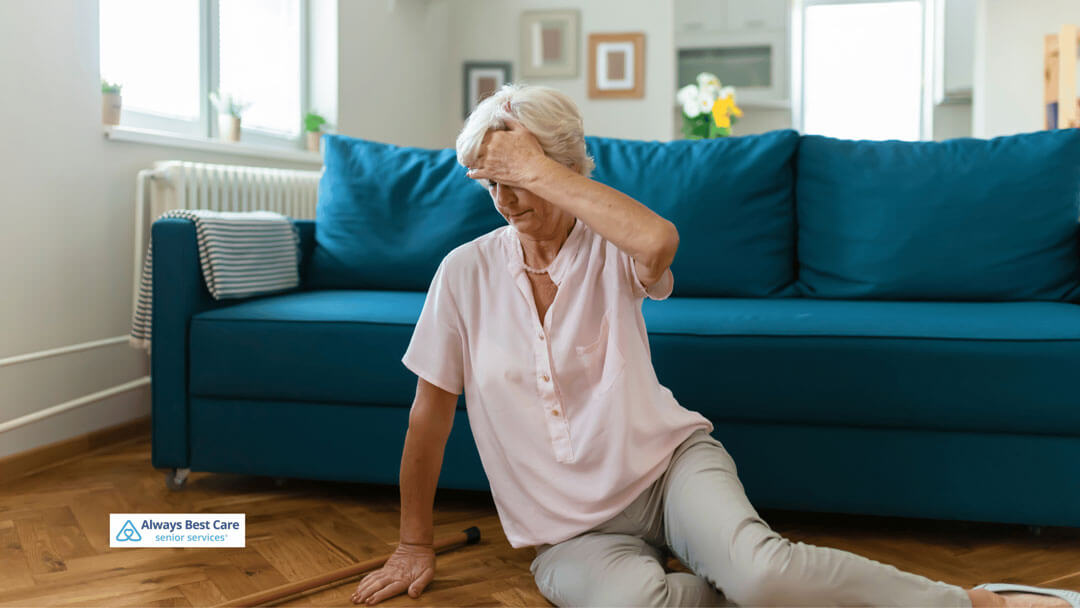9 Commonly Overlooked Fall Risks for Seniors

Maintaining safety at home becomes increasingly important as we age, yet certain risks can be easily overlooked. For seniors, even minor hazards can lead to serious falls.
Below, we highlight some unexpected fall risks lurking in your home and how recognizing them can help keep your loved ones safe.
Table of Contents
Why Risk Awareness is Crucial for Seniors
Falls are one of the leading causes of injury among seniors, and many of these accidents can be prevented with better risk awareness.
For elderly individuals, even a minor fall can lead to severe consequences, such as broken bones, head injuries, or long-term mobility issues. These injuries affect physical health and diminish a senior’s independence, making it harder for them to carry out daily tasks independently.
This often leads to emotional distress and a lower quality of life, as they may begin to feel more vulnerable or isolated.
Cluttered Hallways and Pathways
Even the smallest objects left in hallways or walkways—such as shoes, books, or small furniture—can become tripping hazards.
Ensuring these areas are clear can make a big difference in preventing unnecessary accidents.
Poor Lighting in Key Areas
Dim or poorly lit areas, especially stairways or bathrooms, can make it hard for seniors to see where they’re going.
Installing brighter lights or nightlights in these spaces can help reduce the chances of tripping or bumping into obstacles.
Loose Rugs and Carpets
While rugs may add style to a home, they can also be a slipping risk, especially if not secured to the floor.
Tack down any loose rugs or opt for non-slip pads to avoid accidental falls.
Inconsistent Use of Walking Aids
Sometimes, seniors may feel like they don’t need their cane or walker, but these aids are vital for stability.
Encouraging regular use of these devices helps maintain balance and prevents falls.
Unstable Furniture and Handrails
Seniors often rely on nearby furniture or handrails for support, but they could lead to a fall if they aren’t sturdy.
Ensuring all handrails are correctly installed and that furniture is stable and positioned securely is essential.
Slippery Bathroom Floors
Bathrooms are one of the most hazardous areas for seniors, primarily due to slippery, wet surfaces that increase the likelihood of falls.
Placing non-slip mats in the tub or shower is essential to reduce this risk, as they provide extra grip when stepping in and out.
Additionally, ensuring the floor remains dry, especially after bathing, can further prevent accidents.
Regularly checking and cleaning bathroom floors also creates a safer environment in this high-risk space.
Medication Side Effects
Some medications can cause dizziness, drowsiness, or balance issues, increasing the risk of falling.
It’s important to be aware of any side effects and adjust schedules or routines to prevent falls when taking these medications.
Inadequate Footwear Choices
Wearing loose or unsupportive shoes can significantly increase the risk of slips and falls, particularly for seniors whose balance may already be compromised.
Footwear plays a crucial role in maintaining stability, and shoes that lack proper grip or support can cause missteps, especially on uneven or slippery surfaces.
Seniors should choose footwear designed with non-slip soles, cushioned insoles, and ankle support to help reduce the chances of falling and to enhance overall comfort throughout the day.
Poor Vision or Hearing
When seniors can’t see or hear well, it’s harder to recognize potential hazards around the house.
Regular check-ups for vision and hearing, as well as making adjustments in the home, can significantly reduce the chances of a fall.
How Always Best Care of Cypress Can Help
While addressing these hazards is helpful, professional support from services like Always Best Care of Cypress provides an extra layer of safety.
Caregivers can assess the home for overlooked dangers and suggest personalized modifications that fit the senior’s specific needs. They also offer assistance with mobility, ensuring seniors have the proper support throughout their daily routines.
In addition to home modifications, professional caregivers help seniors follow best practices, such as wearing appropriate footwear, using walking aids, and managing medications that may cause dizziness. These small yet impactful changes create a safer living environment and contribute to overall peace of mind for both seniors and their families.
Ensure Your Loved One’s Safety with Always Best Care of Cypress
Protecting seniors from fall risks starts with awareness and the right support.
At Always Best Care of Cypress, our compassionate team is dedicated to providing personalized in-home care that addresses the unique safety needs of each senior. From fall prevention strategies to daily assistance, we help create a secure, comfortable environment so your loved ones can live confidently at home.
Contact Always Best Care of Cypress at (281) 607-2696 to learn more and schedule your free consultation.





